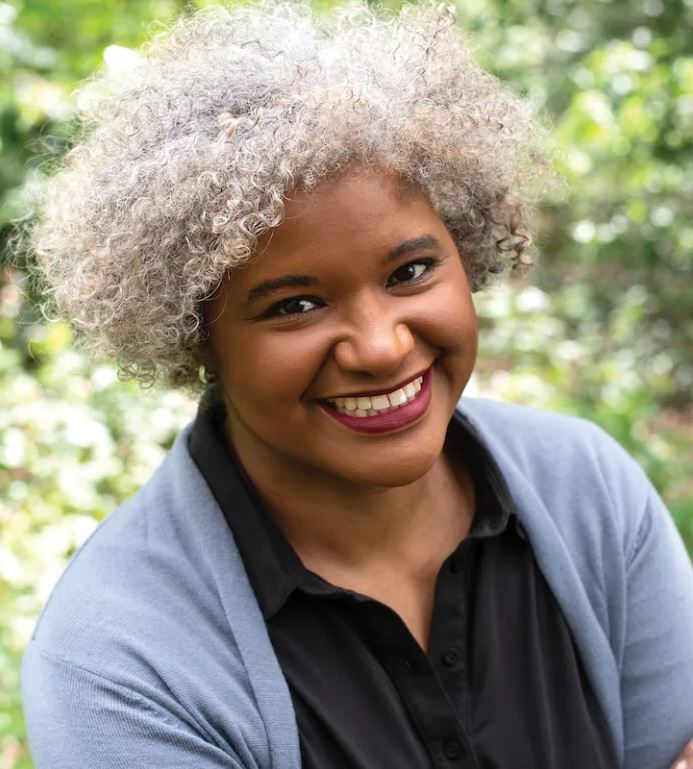By ROBERT LEE BREWER
Debut novelist Tammye Huf discusses how her own familial love story inspired her historical fiction novel, A More Perfect Union.
Tammye Huf grew up in California, before moving first to Germany and then to the U.K. with her husband and their three children. In more normal times, she still returns to the U.S. regularly to catch up with friends and family.

She has worked as a teacher, translator, and copywriter, and has published stories in Diverse Stories Quarterly, The Forge, Ginosko Literary Journal, The Storyteller, Necessary Fiction, New Plains Reviewand The Penman Review. She was runner-up in the 2018 London Magazine Short Story Prize.
In this post, Tammye discusses how her own familial love story inspired her historical fiction novel, A More Perfect Union, what she hopes readers take away from the experience, and more!
What prompted you to write this book?
The book is inspired by my great-great grandparents. He was from Ireland and she was enslaved. When they met and fell in love, he bought her freedom to marry her. After hearing about their incredible relationship, I couldn’t stop thinking about the courage they must have had and the risks and dangers they must have faced. I was especially awed by how intensely they must have loved each other to even attempt such a relationship. I felt their story deserved to be told.
How long did it take to go from idea to publication? And did the idea change during the process?
It took me about four years to write A More Perfect Union. When I sent it out, it was picked up pretty quickly, and then it took a year until its initial publication in the U.K., and then another year to be published in the U.S.
The idea didn’t change during the process, but the voice became clearer and the story was sharpened. The biggest difference between the earlier drafts and the final version is that a third character, Maple, became a point of view character alongside Sarah and Henry. Her story always existed, but by giving her a point of view, I could highlight a counter narrative to the interracial love story and incorporate a fuller perspective into the lives of the enslaved community.
Were there any surprises or learning moments in the publishing process for this title?
Since A More Perfect Union is my debut, the whole publishing process was new to me and felt like a series of learning moments. One significant thing I needed to learn was how to speak about my book succinctly by reducing it to its core idea.
There are so many themes and subplots going on in the novel that I would love to talk about, but there’s rarely time to introduce the book in that much detail. Instead, I’ve learned to speak broadly about the larger issues and leave the subtler topics and secondary conflicts for the reader to discover in the text.
Were there any surprises in the writing process for this book?
The frame of the story was clear to me from the start, but as I researched the time period, I found myself shaping subplots and scene details based on some of the historical facts that I had read about. I had expected my extensive research to help me stay historically accurate, but I hadn’t expected it to help me develop my storyline.
A number of research surprises made it into the book, but one of my favorites did not. I discovered that my great-great grandparents were not alone in bucking the system for love, and that there were other 19th century interracial couples who also defied the norms and laws of society to be together.
What do you hope readers will get out of your book?
In recent years, there has been a lot of national and international attention acknowledging that race relations remain a struggle. I hope that knowing A More Perfect Union is inspired by real people who overcame extraordinary obstacles in a much more divided society might encourage readers to believe that we can rise above what divides us today.
If you could share one piece of advice with other writers, what would it be?
Trust in the process. Don’t be discouraged if your first attempts are awkward and clunky. Mine certainly are. But the first draft isn’t the finished story. It’s just a start. For me, such a large part of developing as a writer was learning to get the story out, even if it’s a bit misshapen, and then embracing the challenge of molding that imperfect draft into something to be proud of.
Robert Lee Brewer is Senior Editor of Writer’s Digest, which includes managing the content on WritersDigest.com and programming virtual conferences. He’s the author of 40 Plot Twist Prompts for Writers: Writing Ideas for Bending Stories in New Directions, The Complete Guide of Poetic Forms: 100+ Poetic Form Definitions and Examples for Poets, Poem-a-Day: 365 Poetry Writing Prompts for a Year of Poeming, and more. Also, he’s the editor of Writer’s Market, Poet’s Market, and Guide to Literary Agents. Follow him on Twitter @robertleebrewer.
Curated from Writer’s Digest.